|
|
|
Sort Order |
|
|
|
Items / Page
|
|
|
|
|
|
|
| Srl | Item |
| 1 |
ID:
102429
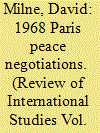

|
|
|
|
|
| Publication |
2011.
|
| Summary/Abstract |
This article draws on fresh archival research to challenge Robert Putnam's 'Two Level Game Theory'. In his seminal article, 'Diplomacy and Domestic Politics: The Logic of Two Level Games', published by International Organization in 1988, Putnam contended that international negotiations proceed at the domestic level and at the international level. In taking diplomatic initiatives forward, leaders are compelled to respond to the needs of domestic constituencies, through granting concessions and building coalitions, while international negotiations are pursued with one goal in mind: that any agreement will not damage the domestic political calculus. This article contends that Lyndon Johnson's actions in 1968 disprove this thesis. The President was in fact relaxed about a Richard Nixon victory in the general election as his commitment to defend South Vietnam from communism was stronger than that of his sitting Vice President, Hubert Humphrey. The President's concern for the fate of South Vietnam thus superseded his concern for his 'normal supporters'- the Democratic Party at large - who had become so hostile towards his management of the Vietnam War.
|
|
|
|
|
|
|
|
|
|
|
|
|
|
|
|
| 2 |
ID:
095112
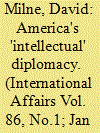

|
|
|
|
|
| Publication |
2010.
|
| Summary/Abstract |
Historians and journalists such as Richard Hofstadter and Susan Jacoby have decried the reality 'of anti-intellectualism' in American society, culture, and politics. Yet intellectuals have played a vital role in shaping US diplomacy-from Alfred Thayer Mahan to Paul Wolfowitz. This article explores the varied reasons why the US government has proved so amenable to input from academia, think-tanks and freelance intellectuals. It first discusses the varying ways in which 'the intellectual' has been defined, and proposes criteria that allow us to identify the foreign policy intellectual. Second, the article examines the historical circumstances that have allowed intellectuals-broadly conceived-to influence US diplomacy from 1890 to the present; focusing on the proliferation of US colleges through the nineteenth century, pioneering attempts to utilize the academy such as Robert La Follette's 'Wisconsin Idea', the professionalization of US higher education inspired by the achievements of Germany's research universities and the strong links forged between academia, think-tanks and government through the progressive era, two world wars, and into the Cold War and beyond. Third, the article compares the US experience of welcoming intellectuals into policy-making with that of the United Kingdom and France, the two democracies that have displayed a global ambition comparable to the United States in recent history. The article concludes with a discussion of the intellectual types-historian or IR scholar, generalist or specialist, fox or hedgehog-that are best suited to dispensing foreign policy advice. It warns that those intellectuals with theories to prove often lack the cognitive flexibility required when making diplomacy.
|
|
|
|
|
|
|
|
|
|
|
|
|
|
|
|
| 3 |
ID:
074522
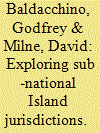

|
|
|
| 4 |
ID:
115275
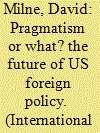

|
|
|
|
|
| Publication |
2012.
|
| Summary/Abstract |
This article discusses the intellectual sources of the presidential candidates' foreign policies. In the case of Barack Obama, the article examines the formation of his worldview, his intellectual inspirations, his most significant foreign policy appointments and the diplomatic course he has pursued as president. Mitt Romney's foreign policy views are harder to identify with certainty, but his business and political career-as well as the identity and dispositions of his advisory team-all provide important clues as to the policies he will pursue if elected in November 2012. The article finds much common ground between the two candidates; both are results-driven pragmatists, attuned to nuance and complexity, who nonetheless believe-in agreement with Robert Kagan-that US geostrategic primacy will continue through the span of the twenty-first century. The gulf between the candidates on domestic policy is vast, but on foreign policy-Romney's bellicose statements through the Republican primaries served a purpose that has passed-there is little between them.
|
|
|
|
|
|
|
|
|
|
|
|
|
|
|
|
| 5 |
ID:
190577
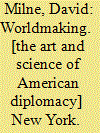

|
|
|
|
|
| Publication |
New York, Farrar, Straus and Giroux, 2015.
|
| Description |
609p.hbk
|
| Standard Number |
9780374292560
|
|
|
|
|
|
|
|
|
|
|
|
Copies: C:1/I:0,R:0,Q:0
Circulation
| Accession# | Call# | Current Location | Status | Policy | Location |
| 060390 | 327.73/MIL 060390 | Main | On Shelf | General | |
|
|
|
|
|
|
|
|
|